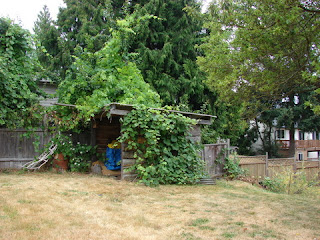 |
How times have changed... We started with one raised bed built during our first summer and that has expanded each year.
This year's project is to install some squash beds along the south-facing side of the house. That side gets great sunshine during the summer and gets very hot with sun and heat reflecting off the stucco siding. Perfect for heat-loving squash and zucchini.
We don't even have to deal with the sod in that area as the ground was torn up and redeposited during perimeter drain excavation work. We already knew, but learned again, how insanely rocky the underlying soil is - glacial till at its finest. We will never have a shortage of rocks in our yard... Just choose a spot, dig down more than 2 inches and start excavating... We have done a lot of digging in our yard as we have planted various shrubs, grasses, and removed the lawn to build raised beds. It seems we are on point... at least in this area.
Replacing a lawn with a garden, be it flower or vegetable, is a growing trend. A lawn is not very eco-friendly on a number of fronts.
 |
| Before... |
My Dad was one of those older retired gentleman. When he lived in our basement suite, he could never understand why we didn't water the lawn and spread weed killer and moss killer all over it. I tried to get to the heart of what it was for him... something along the lines of "what will the neighbours think". I would hope that they'll think that we are eco-friendly rather than sloppy homeowners...
 |
| After... |
And the run off from the lawns... as they are watered... means the biocides end up in the streams and rivers where they continue to poison and kill.
There are of course, other options... like tearing out the grass and laying artificial turf. Although... there is a house near us where the front lawn is artificial and... it has weeds growing in it. Real weeds obviously. I'm not sure how that is even possible but it is... Mind you, the older, retired gentleman who lives there seems to be a Snow Bird who doesn't do a lot of yard work...
And then... one could also just paint the yellow lawn in the summer rather than watering it... it's a growing trend although seems rather... excessive. In our community, a yellow lawn in summer is a badge of honour...
Lawns are also a lot of work... even if all you do is mow them... they are a hassle. And let's not even talk about the weeding and feeding via various means. I go over the front lawn on my hands and knees a couple of times in the summer and stab out the worst dandelions and other weeds. It's easier during the dry season because the grass is golden and the weeds are still green which makes them super easy to spot... But all that crawling and stabbing is hard work... although very therapeutic...
 |
| A house in Quebec... before and after |
We have debated turning the front yard into a series of veggie beds but... we also suffer from a plague of deer all year round. And deer love nothing better than to sample each and every plant to see whether it is palatable. Most vegetables would be right up their alley...
Although... perhaps potatoes (leaves are toxic) or rhubarb (also toxic) would survive the deer buffet? We did try a few squash one year which seemed to do OK with their prickly stalks and leaves.
Mind you... raised beds are not all fun and games. Our dry summers mean that watering the veggie beds can be an onerous task. Most vegetables benefit from low and slow watering but in the summer we are limited to hand watering... which means most beds get heavy and fast watering which doesn't benefit things like carrots. We've tried them and they are super fat at the surface, a good inch in diameter but... only an inch long. It's the watering thing... heavy and fast means only the top laywer of soil gets watered. We need low and slow... Our goal is to get an irrigation system for each of the raised beds but other priorities have... well... taken priority. Perhaps this year it will actually happen given the enforced stay-at-home-as-much-as-possible orders. Which show no signs of easing as I write this (April 1).
WHAT'S WRONG WITH DANDELIONS??????
ReplyDeleteThat's species-ist, that is.....
Nuthin... they are just... sooooo... hardy!
ReplyDelete